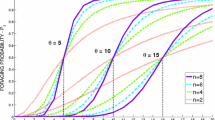Abstract
Swarm robotics is a branch of collective robotics that outperforms many other systems due to its large number of robots. It allows for performing several tasks that are beyond the capability of a single or multi robot systems. Its global behaviour emerges from the local rules implemented on the level of its individual robots. Thus, estimating the obtained performance in a self-organized manner represents one of the main challenges, especially under complex dynamics like spatial interferences. In this paper, we exploit the central limit theorem (CLT) to analyse and estimate the swarm performance over long-term deadlines and under potential spatial interferences. The developed model is tested on the well-known foraging task, however, it can be generalized to be applied on any constrictive robotic task.
Access this chapter
Tax calculation will be finalised at checkout
Purchases are for personal use only
Preview
Unable to display preview. Download preview PDF.
Similar content being viewed by others
References
Goldberg, D.: Evaluating the dynamics of agent-environment interaction. Ph.D. thesis, University of Southern California (2001)
Goldberg, D., Matarić, M.J.: Reward maximization in a non-stationary mobile robot environment. In: Proceedings of the fourth International Conference on Autonomous Agents, AGENTS 2000, pp. 92–99. ACM, New York (2000)
Jacod, J., Podolskij, M., Vetter, M.: Limit theorems for moving averages of discretized processes plus noise. The Annals of Statistics 38(3), 1478–1545 (2010)
Lein, A., Vaughan, R.T.: Adaptive multirobot bucket brigade foraging. In: Proceedings of the Eleventh International Conference on Artificial Life, ALife XI, pp. 337–342. MIT Press (2008)
Lerman, K., Galstyan, A.: Mathematical model of foraging in a group of robots: Effect of interference. Autonomous Robots 13(2), 127–141 (2002)
Lerman, K., Martinoli, A., Galstyan, A.: A Review of Probabilistic Macroscopic Models for Swarm Robotic Systems. In: Şahin, E., Spears, W.M. (eds.) Swarm Robotics 2004. LNCS, vol. 3342, pp. 143–152. Springer, Heidelberg (2005)
Liu, W., Winfield, A.F.T., Sa, J.: Modelling swarm robotic systems: A case study in collective foraging. In: Towards Autonomous Robotic Systems (TAROS 2007), pp. 25–32. Aberystwyth (2007)
Martinoli, A., Easton, K., Agassounon, W.: Modeling swarm robotic systems: A case study in collaborative distributed manipulation. Int. Journal of Robotics Research 23, 415–436 (2004)
Muniganti, P., Pujol, A.O.: A survey on mathematical models of swarm robotics. In: Workshop of Physical Agents (2010)
Ostergaard, E.H., Sukhatme, G.S., Matari, M.J.: Emergent bucket brigading: a simple mechanisms for improving performance in multi-robot constrained-space foraging tasks. In: Proceedings of the Fifth International Conference on Autonomous Agents, AGENTS 2001, pp. 29–30. ACM, New York (2001)
Pinciroli, C., Trianni, V., OGrady, R., Pini, G., Brutschy, A., Brambilla, M., Mathews, N., Ferrante, E., Caro, G., Ducatelle, F., Birattari, M., Gambardella, L., Dorigo, M.: Argos: a modular, parallel, multi-engine simulator for multi-robot systems. Swarm Intelligence 6, 271–295 (2012)
Pini, G., Brutschy, A., Birattari, M., Dorigo, M.: Interference reduction through task partitioning in a robotic swarm or: dont you step on my blue suede shoes! (2009)
Pini, G., Brutschy, A., Birattari, M., Dorigo, M.: Task partitioning in swarms of robots: Reducing performance losses due to interference at shared resources. In: Cetto, J., Filipe, J., Ferrier, J.L. (eds.) Informatics in Control Automation and Robotics. LNEE, vol. 85, pp. 217–228. Springer, Heidelberg (2011)
Rice, J.A.: Mathematical Statistics and Data Analysis, 3rd edn. Duxbury Press (April 2001)
Shell, D.A., Mataric, M.J.: On foraging strategies for large-scale multi-robot systems. In: IEEE/RSJ International Conference on Intelligent Robots and Systems, pp. 2717–2723. IEEE (2006)
Vaughan, A.L.R.T.: Adaptive multi-robot bucket brigade foraging. Artificial Life 11, 337 (2008)
Author information
Authors and Affiliations
Editor information
Editors and Affiliations
Rights and permissions
Copyright information
© 2013 Springer-Verlag Berlin Heidelberg
About this paper
Cite this paper
Khaluf, Y., Birattari, M., Rammig, F. (2013). Probabilistic Analysis of Long-Term Swarm Performance under Spatial Interferences. In: Dediu, AH., Martín-Vide, C., Truthe, B., Vega-Rodríguez, M.A. (eds) Theory and Practice of Natural Computing. TPNC 2013. Lecture Notes in Computer Science, vol 8273. Springer, Berlin, Heidelberg. https://doi.org/10.1007/978-3-642-45008-2_10
Download citation
DOI: https://doi.org/10.1007/978-3-642-45008-2_10
Publisher Name: Springer, Berlin, Heidelberg
Print ISBN: 978-3-642-45007-5
Online ISBN: 978-3-642-45008-2
eBook Packages: Computer ScienceComputer Science (R0)




